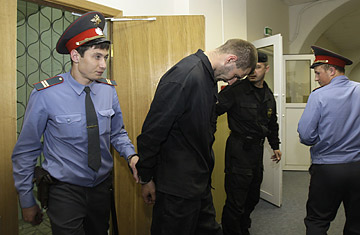
A suspected hijacker of the Arctic Sea is escorted by Russian police at Moscow's Basmanny Court on Aug. 21, 2009
(2 of 2)
There are many governments, however, that would be more concerned about a possible missile shipment, especially if it were destined for the Middle East. Chief among them is Israel. In recent years, the Israeli government has consistently raised alarms about Russia's plans to sell MiG-31 fighter planes to Syria and its construction of a nuclear-power station in southwestern Iran. Negotiations with Moscow have been tough on these issues and relations often icy, as the Israeli President pointed out during his visit to Russia on Aug. 18, just as the mysteries behind the Arctic Sea's disappearance began to unfold.
"The most likely explanation is that the Israelis intercepted this cargo, which had been meant for Syria or Iran," says Yulya Latynina, a prominent political commentator and radio host on Echo of Moscow, a station owned by state-controlled gas giant Gazprom. "They will now use the incident as a bargaining chip with Russia over weapons sales in the region, while allowing Russia to save face by taking its empty ship back home." When contacted by TIME, both the Israeli Prime Minister's office and Mossad, Israel's secret service, declined to comment.
But in an Aug. 18 statement, the Israeli Foreign Ministry said that Peres had discussed "the sale of Russian weapons and military hardware to countries hostile to Israel" with his Russian counterpart, Dmitri Medvedev, on that day during four hours of closed-door talks in the Russian city of Sochi. According to the statement, Peres "stressed that Israel has concrete proof of Russian weapons being transferred to terrorist organizations by Iran and Syria, especially to Hamas and Hizballah." A spokeswoman for the Israeli President declined to elaborate on any connection with the Arctic Sea. In a parallel statement, the Kremlin did not mention weapons sales, saying after the meeting that "we more clearly and precisely understand each other's positions."
Russia's chief investigator, Alexander Bastrykin, told official state newspaper Rossiyskaya Gazeta that a band of new-age pirates, possibly in connivance with the crew, is all that lies behind the Arctic Sea mystery. But he did concede that there are questions that need answering. "We don't rule out the possibility that [the ship] was carrying more than just timber," he said, without elaborating further.
Speaking to TIME, NATO envoy Rogozin backed up the investigator's statement: "The cargo has to be checked to see if there was something illegal, something being smuggled." But he declined to comment on the theory of Israeli interception. "This is no longer a question for diplomats or for the military," he said. "It is now a question for the investigators, and they are carrying on with their work. We are also very curious to hear their findings."
When asked by TIME about the possibility that the Arctic Sea was carrying a secret cargo, Vladimir Voronov, deputy head of Oy Solchart Management — the Helsinki-based, Russian-run company that operates the ship — replied, "I don't know anything about a secret cargo. We're just a simple shipping firm, and from what we understand, our ship was hijacked."
According to investigator Bastrykin, a full search of the vessel will be carried out when the ship arrives at a Russian port in the next few weeks. But observers don't expect any revelations. "The versions we are getting from the Russian government do not fit into any logical parameters, and I don't think that will change," commentator Latynina says. "When people lie, they tend to lie consistently."
